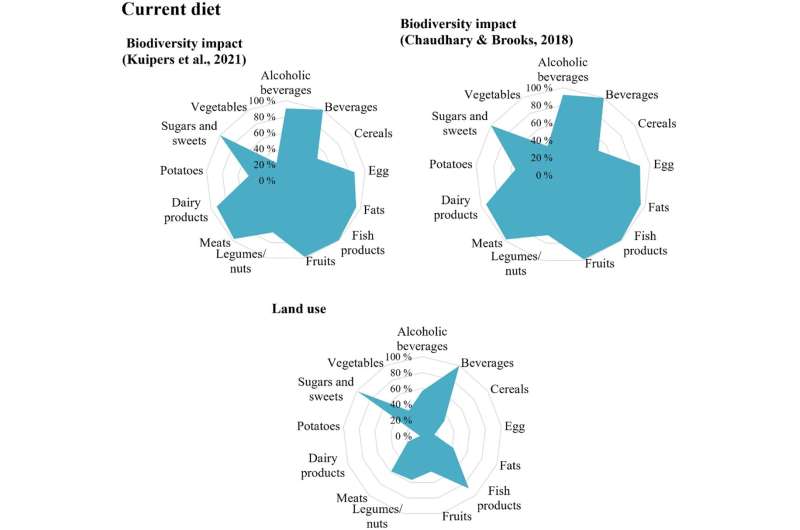This article has been reviewed according to Science X's editorial process and policies. Editors have highlighted the following attributes while ensuring the content's credibility:
fact-checked
proofread
The amount of imported products and meat in the Finnish diet has the most significant impact on global biodiversity loss

A recent study shows that the adverse impact of the current Finnish diet on biodiversity can be reduced by shifting to more plant-based diet. The impact of the current Finnish diet nearly exclusively comes from imported products when using life cycle assessment (LCA) methods focused on global species loss. Identifying the impact on biodiversity more locally in Finland calls for the development of assessment methods.
The study conducted by the Natural Resources Institute Finland (Luke) assessed the impact of the current diet and four alternative diets on global biodiversity loss using two LCA methods.
They were based on the area required for production, species richness and the number of local species in geographic areas that represent production areas. Because the assessments focused on the impact of diets, the results were also significantly affected by the amount of different products in each diet. The study has been published in the International Journal of Life Cycle Assessment.
Of the assessed diets, the current diet was based on previous consumption studies, especially on the FinDiet 2017 survey (urn.fi). In the alternative diets that meet the nutrient intake recommendations, the amount of meat was reduced gradually all the way to a vegan diet. The climate impact of diets has been assessed previously, as reported in the FoodMimimum project's final report and published in the Frontiers in Sustainable Food Systems.
"Adverse impact on biodiversity decreased significantly in proportion to the decreasing amount of meat in diets. A vegan diet had the lowest impact, only 30 percent of the impact of the current diet. This is a similar, although even clearer, trend than in previous assessment of climate impact," says Venla Kyttä, Research Scientist at Luke.
Broiler meat has the highest impact
Of the product groups included in the current average Finnish diet, poultry meat has the most significant impact on global biodiversity loss.
"Other product groups with a significant impact include farmed fish, cocoa, pork, coffee and beef that, combined with broiler meat, account for almost 60 percent of the impact of the diet on biodiversity loss. However, the differences between the product groups are fairly small," Venla Kyttä says.
The impact of poultry meat can be explained by the soy-based feed used in production. Poultry meat production involves a significant risk of biodiversity loss, as the growing global demand for soy-based feed results in larger production areas. The impact of fish on biodiversity loss is also mostly attributable to the feeding of imported fish.
The impact of the use of soy as feed is based on the resulting land-use change, whereas the significant impact of coffee and cocoa is related to longer-term land use for agricultural production.
Beef accounts for a much smaller part of the impact of diets on global biodiversity loss than of their climate impact, regarding which its role is significantly the highest.
"According to this new study, the impact of domestic broiler meat on global biodiversity loss per kilogram of product is almost double that of domestic beef as a result of different feeding practices. There is a similar ratio between imported broiler meat and beef," says Merja Saarinen, Research Manager and Senior Scientist at Luke.
Global biodiversity loss takes place in import countries
Roughly half of the area used to make the products used in the Finnish diet is in Finland, while the remaining area is in import countries. In contrast, imports account for up to 85 percent of the adverse impact on global biodiversity loss.
The role of imports is emphasized in the impact of the Finnish diet on global biodiversity loss, as biodiversity is richer in many food and feed producer countries and such countries have local species, unlike the northern zones in which Finland is situated. This applies to soy-based feed and coffee and cocoa alike.
"Domestic production affects biodiversity in various ways, but it only has a minor impact on global biodiversity loss," says Terho Hyvönen, Research Professor at Luke.
The most common LCA method used in the study to assess the impact of diets on biodiversity serves to identify the products and the parts of the production chain that involve the most significant risks associated with global species extinction. However, the method cannot be used to identify any local biodiversity impact related to the production and consumption of products.
"We are currently developing LCA methods in several projects to assess the impact of the production of agricultural and forestry products on biodiversity in Finland," Merja Saarinen says.
More information: Venla Kyttä et al, Land-use-driven biodiversity impacts of diets—a comparison of two assessment methods in a Finnish case study, The International Journal of Life Cycle Assessment (2023). DOI: 10.1007/s11367-023-02201-w
Merja Saarinen et al, Soil carbon plays a role in the climate impact of diet and its mitigation: the Finnish case, Frontiers in Sustainable Food Systems (2023). DOI: 10.3389/fsufs.2023.904570
Provided by Natural Resources Institute Finland (Luke)


















